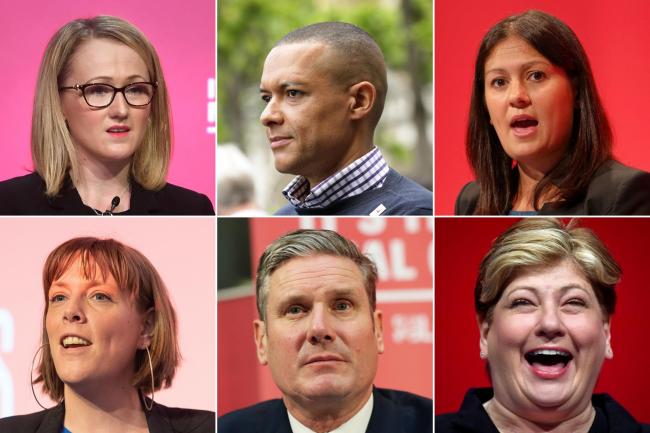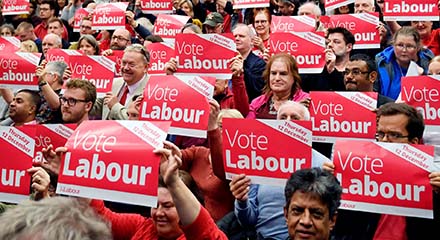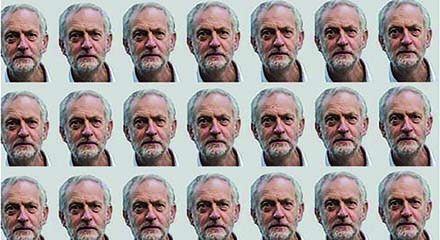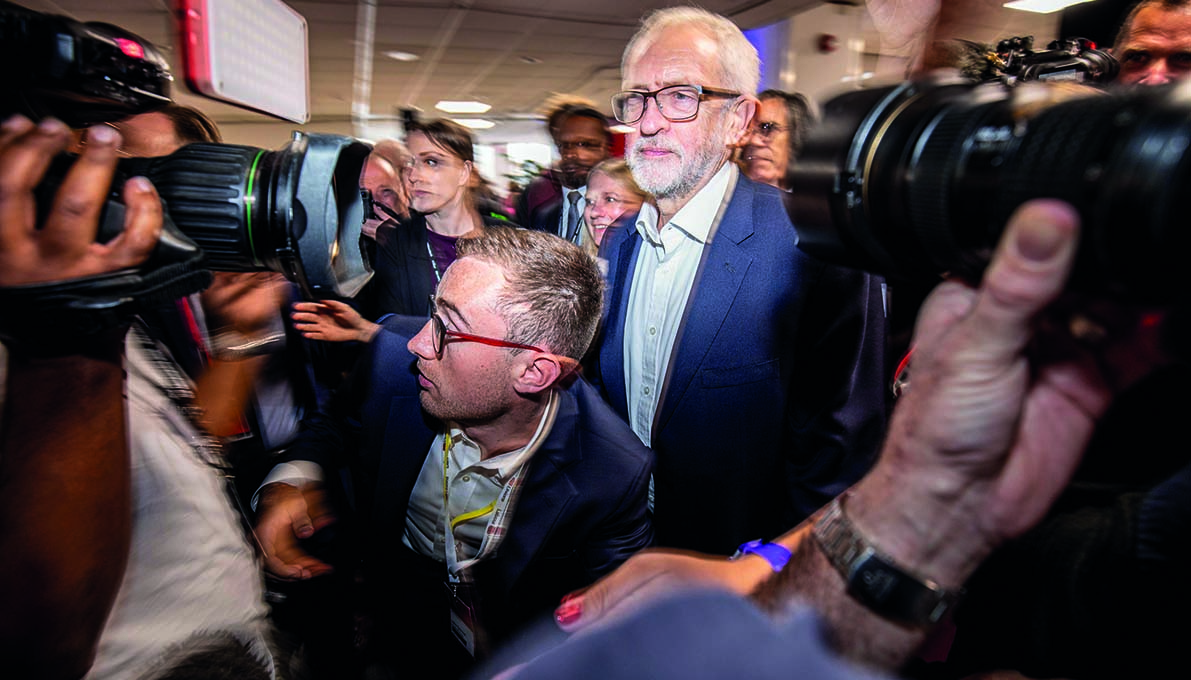Carla Roberts says that candidates in the Labour leadership elections can – and should be – pressurised from the left
We know, of course, that Jeremy Corbyn is not, and never has been, a Marxist. He is a sincere, but dithering, left reformist who will do anything to try and appease his opponents rather than fight them – we have had plenty of opportunity to witness this political weakness over the last five years.
And yet we have to admit to still being gobsmacked about his proposed nominations for the House of Lords. Firstly, the man is supposed to be a republican. Why on earth would he nominate anybody for this wretched symbol of privilege, whose only purpose is to stop and delay the ‘commoners’ from making any decisions that are seen as too radical? We note that Labour’s manifesto in the 2019 election promised to abolish the House of Lords (though it wants it replaced with an elected “senate” – but why should there be any checks and balances from above or “the regions”? Surely they’re voting for MPs in those “regions” too).
During his first leadership campaign in 2015, Corbyn told Channel 4 News he saw “no case” for appointing new peers. A position he should have stuck to. But he quickly backtracked, successively nominating, amongst others, Shami Chakrabarti in 2016 and, in 2018, former witch-finder general Iain McNicol. As general secretary of the Labour Party, McNicol helped to launch and maintain the witch-hunt against Corbyn and the left and appointed many of the rightwingers who still control layer upon layer of the party bureaucracy. He now goes by the fetching title, Lord McNicol of West Kilbride, and makes ample use of claiming the attendance allowance of £305 per day (which he enjoys in addition to subsidised restaurant facilities and travel expenses).
His nomination was a way to sweeten and hasten his overdue departure from the general secretary post. We would have preferred it if Corbyn had tried to get him sacked outright – was there no chance of a majority on the national executive committee for that? Still, we can understand why Corbyn went down this route: it was a way to get rid of one of his biggest and most powerful opponents in the middle of the civil war, when he had everything still to play for.
The situation today is vastly different – Corbyn has finally been forced out of his job. Which is why we really cannot see any rational reason for him nominating Tom Watson, just before his own departure as leader of the Labour Party. For four and a half years, Twatson did everything in his power to undermine the leader. He orchestrated both coups against him, launched a number of open letters, and cohered the right wing inside the Labour Party. So, even if Corbyn had foolishly promised him a seat in the House of Lords in order to get rid of him just before the election, the result of that election surely should have led him to rip up that promise – after all, Watson’s activities have played a huge role in making sure Labour under the ‘unelectable’ Corbyn got trounced.
But the fact that Corbyn seems to feel the need to honour that promise just shows that he is and remains very much part of ‘the system’ – an honourable and thereby rather ineffective Labour politician. The nomination of the former speaker is easier to understand. John Bercow has been on a journey. Beginning as a Monday Club Tory he is now described as an “independent”. He certainly made life difficult for Theresa May and Boris Johnson over Brexit. That said, we are more than puzzled that Corbyn’s close comrades, Karie Murphy and Katy Clark, would be interested in taking up a position in that house of privilege. Like the hundreds of people who have over the years rejected the so-called ‘honours’ bestowed by the monarch, real socialists should just say no.
This is part of the astonishing legacy that Corbyn leaves behind. Yes, there was a mass influx into the party, a real sense of hope that things could be different. But we have to be honest: the political opportunities that opened up with Corbyn’s election were all but wasted. There has been almost no progress in terms of the democratisation of the party. Corbyn squandered the opportunity to reintroduce the mandatory reselection of parliamentary candidates at the 2018 conference, by instructing Len McCluskey to use Unite’s block vote to stop open selection. And, worst of all, Corbyn and his allies have silently stood by and watched, as hundreds of his supporters were thrown to the wolves in the ongoing witch-hunt in the party.
The refusal by Corbyn and his advisors to stand up to the right is already having serious political consequences that go far wider than the Labour Party: council after council is banning the Boycott, Divestment and Sanctions movement (BDS), which before long could well be declared anti-Semitic and thereby illegal (witness the decision of the German parliament). Perhaps we will soon see official regulations characterising anti-Zionism as violating official anti-racism, being closely associated with terrorist tendencies and therefore notifiable to the Prevent bureaucracy (I am little bit surprised it has not happened already). Any war in the Middle East, especially if it involves Israel, will increase the intensity and scope of the ‘Anti-Zionism equals anti-Semitism’ smear campaign. Anti-imperialism and anti-capitalism could easily fall into the net too.
10 pledges
This is, of course, why most of the candidates in the Labour leadership elections have been falling over themselves to sign up to the so-called ‘10 pledges’ published by the Board of Deputies of British Jews. They all want to appear respectable and seen to be doing ‘everything in their power to eradicate anti-Semitism from the party’. However, most members know from first-hand experience that this is based on a lie. Anti-Semitism is not rife in the Labour Party – there have been a miniscule number of genuine cases, while most allegations were trumped up in order to smear Corbyn.
No wonder really that Rebecca Long Bailey’s enthusiastic support for the pledges has been hugely controversial on the left. There is a real risk that this has, in effect, handed the leadership to Keir Starmer: support for her campaign, which was only ever lukewarm, has cooled considerably as a result.
The reason is obvious. The pro-Tory BoD demands that the Labour Party hands over its disciplinary process to “an independent provider” (the BoD would probably volunteer itself) and wants to decide who should or should not be a member of the party: “prominent offenders such as Ken Livingstone and Jackie Walker” should receive lifetime bans, the BoD demands.
As a much-publicised open letter by Labour Against the Witchhunt to Rebecca Long-Bailey (signed by almost 4,500 people) states,
The BoD is not a neutral body, but one with an evident political agenda: to attack, weaken and destroy any opposition to the systematic and brutal oppression of the Palestinians by the Israeli government. The BoD encourages the conflation of criticism of the Israeli government (anti-Zionism), with anti-Semitism (hatred of Jews). The BoD, and its individual officers, have maintained open hostility to Labour since Corbyn took leadership of the party. They organised the ‘Enough is Enough’ demonstration outside parliament in March 2018, which was clearly aimed at weakening and attacking Jeremy Corbyn.
We believe that the BoD’s ‘10 pledges’ are an outrageous political interference by an organisation that is overtly hostile to today’s Labour Party and everything it stands for. If implemented, these policies would, for example, result in the suspensions and expulsions of the thousands of Labour members who have stood in open solidarity with those wrongly accused of anti-Semitism, including Chris Williamson, Jackie Walker, Ken Livingstone and Marc Wadsworth.
It was refreshing to see that Richard Burgon, standing for the deputy leader of the party, used the official hustings meeting in Liverpool last week to volunteer his position: “I have not signed and will not sign the 10 pledges. I have concerns, for example, about the outsourcing our disciplinary process.” He also said that he wants to work with all Jewish organisations and not just the ones the BoD considers worthy (needless to say, Jewish Voice for Labour is excluded from its list). He also pointed out that, “On the IHRA definition, the party agreed to add in a clear statement that it wouldn’t undermine freedom of expression on Israel and Palestine. These are points I want to raise with the Board of Deputies.”
Dawn Butler, at the same hustings event, also said she has not signed the pledges – however, in a rather rambling contribution, she suggested that instead she wants to make sure that the “report being produced by the Equality and Human Rights Commission into the Labour Party is fully implemented”. Without even knowing what kind of results or recommendations this biased body will come up with! Even the centrist, Angela Rayner, who has signed the pledges, disagreed with its key demand to hand over the disciplinary process: “I don’t want to outsource the problem – we have to deal with it ourselves.”
Rebecca Long Bailey would do well to row back on her support for the pledges – though her campaign manager, Jon Lansman, is probably stopping her from doing so. But, just like Corbyn, she will never be able to bend backwards far enough to appease the right. Surely, that is a lesson we all should have learned over the last five years.
Open selection
Lansman and Long Bailey have instead decided to go for the ‘open selection’ ticket to save her campaign. Momentum has sent out a rather strange email, celebrating this “huge news”: “Our movement has been pushing for open selections for years, and this announcement shows that Rebecca is a Labour leadership candidate who really listens to members.”
Well, it is not exactly the whole movement that has been pushing for open selection, is it, Jon? As soon as Corbyn became leader, the Campaign for Labour Party Democracy – which then still involved Lansman – ditched its decades-long demand for the mandatory reselection of all parliamentary candidates, because Jeremy Corbyn was reluctant to go for it (in one of his many futile attempts to keep the right on board). And in the run-up to the 2018 party conference, Momentum argued against open selection, pushing for the lame reform of the trigger ballot instead.
However, when the campaign for mandatory reselection became absolutely huge in the party, Lansman changed tack and jumped on the bandwagon – one week before conference. Only to jump off it again at conference itself, when Corbyn let it be known publicly that he favoured the reform of the trigger ballot. While over 90% of the Constituency Labour Party delegates voted in favour of the rule change, the unions voted it down and went with the NEC compromise on reforming the trigger ballot. We have seen how useless that rule change has been – the few trigger ballots that did take place ended up with the confirmation of the sitting MP.
It remains to be seen though if this is enough to turn around Long Bailey’s faltering campaign. There is no doubt that she will join Keir Starmer and Lisa Nandy on the ballot paper. Unite is about to nominate her, pushing her over the required 5% hurdle from affiliated organisations. The official decision will be made on January 24, but United Left, which won a majority of seats on the 63-strong Unite executive in 2017, has already endorsed her – and, somewhat more surprisingly, Richard Burgon for deputy. It would take some extraordinary action by Unite leader Len McCluskey to stop either from getting onto the ballot paper.
Emily Thornberry will hopefully soon go the same way as Jess Phillips, who has just stepped down from the leadership race – into political oblivion. Phillips proved to be absolutely useless, even when playing to a friendly media. Thornberry, on the other hand, has managed to alienate the left and the right and is bound to drop out of the race soon, having secured zero nominations, either from CLPs or affiliates. Lisa Nandy, who has just been nominated by the GMB union, has done surprisingly well and might yet slip in through the middle – she has quite successfully positioned herself as the ‘sensible candidate’ between the cold careerist, Starmer, and the Corbyn continuity candidate, Long Bailey. She probably does appeal to many of the over 100,000 new members who have joined since the 2019 election (the majority of whom will probably be somewhere on the political ‘soft left’, rather than the hard left or right of the party). In this context, it is interesting to note that only 15,000 people have paid £25 to become ‘registered supporters’ of the party in order to vote. Compare that to the 180,000 who made use of this provision in 2016 – overwhelmingly in order to support Jeremy Corbyn.
This leadership election is an important, politically fluid period and it gives us an opportunity not just to sound out the various candidates, but to attempt to pull them to the left – and in so doing influence Labour members to fight for what is necessary. We urge Labour members to set Long Bailey a number of conditions before they agree to their CLP nominating her. All of these demands go to the heart of the ongoing civil war in the Labour Party:
- Will you retract your support from the Board of Deputies’ 10 pledges?
- Will you campaign for Labour to support the boycott, disinvestment and sanctions (BDS) campaign?
- Will you campaign for Labour to fight for the abolition of Trident and for unilateral nuclear disarmament?
- Will you campaign for the mandatory reselection of all parliamentary candidates and the further empowerment of Labour members?
- Will you issue an apology to Chris Williamson and ask him to rejoin the Labour Party?


 Nav Mishra, perhaps the worst of the Momentum lot, was even happy to pose in front of a banner of the Jewish Labour Movement when Momentum organised its daft campaign against David Icke’s speaking tour (pictured). This is the same JLM that was
Nav Mishra, perhaps the worst of the Momentum lot, was even happy to pose in front of a banner of the Jewish Labour Movement when Momentum organised its daft campaign against David Icke’s speaking tour (pictured). This is the same JLM that was 





